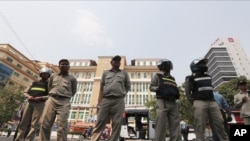Cambodia resumed the treason trial of banned opposition party leader Kem Sokha on Wednesday after a two-year delay due to the pandemic, in a case the United States has condemned as politically motivated.
Kem Sokha was arrested in 2017, and his opposition Cambodia National Rescue Party (CNRP) was banned ahead of a 2018 election that was swept by the Cambodian People's Party (CPP) of Prime Minister Hun Sen.
CNRP has since been decimated, with many of its members arrested or fleeing into exile in what activists say is a sweeping crackdown designed to thwart challenges to CPP's power monopoly.
"I hope ... the court will decide to drop the charges against me so that we can reach national reconciliation and national unity to develop our country," Kem Sokha told reporters from his home before arriving at the Phnom Penh Municipal Court.
Kem Sokha was freed from house arrest in 2019 but remains banned from political activities.
His daughter Monovithya Kem on Tuesday had also urged the court to drop the charges, adding that her father was in "strong spirits."
The treason charges stem from accusations he was conspiring with the United States to overthrow self-styled strongman Hun Sen, who has ruled Cambodia for nearly four decades.
Kem Sokha denies the charges, and the United States has dismissed the allegations as "fabricated conspiracy theories."
The U.S. embassy in Phnom Penh urged authorities to stop "politically motivated trials," including that of Kem Sokha and other members of the political opposition, journalists, and labor and environmental activists.
"Promoting democracy and respect for human rights is central to U.S. foreign policy in Cambodia and around the world," embassy spokesperson Chad Roedemeier said.
Cambodia's Justice Ministry has said the trials were not politically motivated and urged the U.S. embassy to provide evidence to support its claim and not to interfere.
"This allegation is legally baseless," ministry spokesman Chin Malin said.





